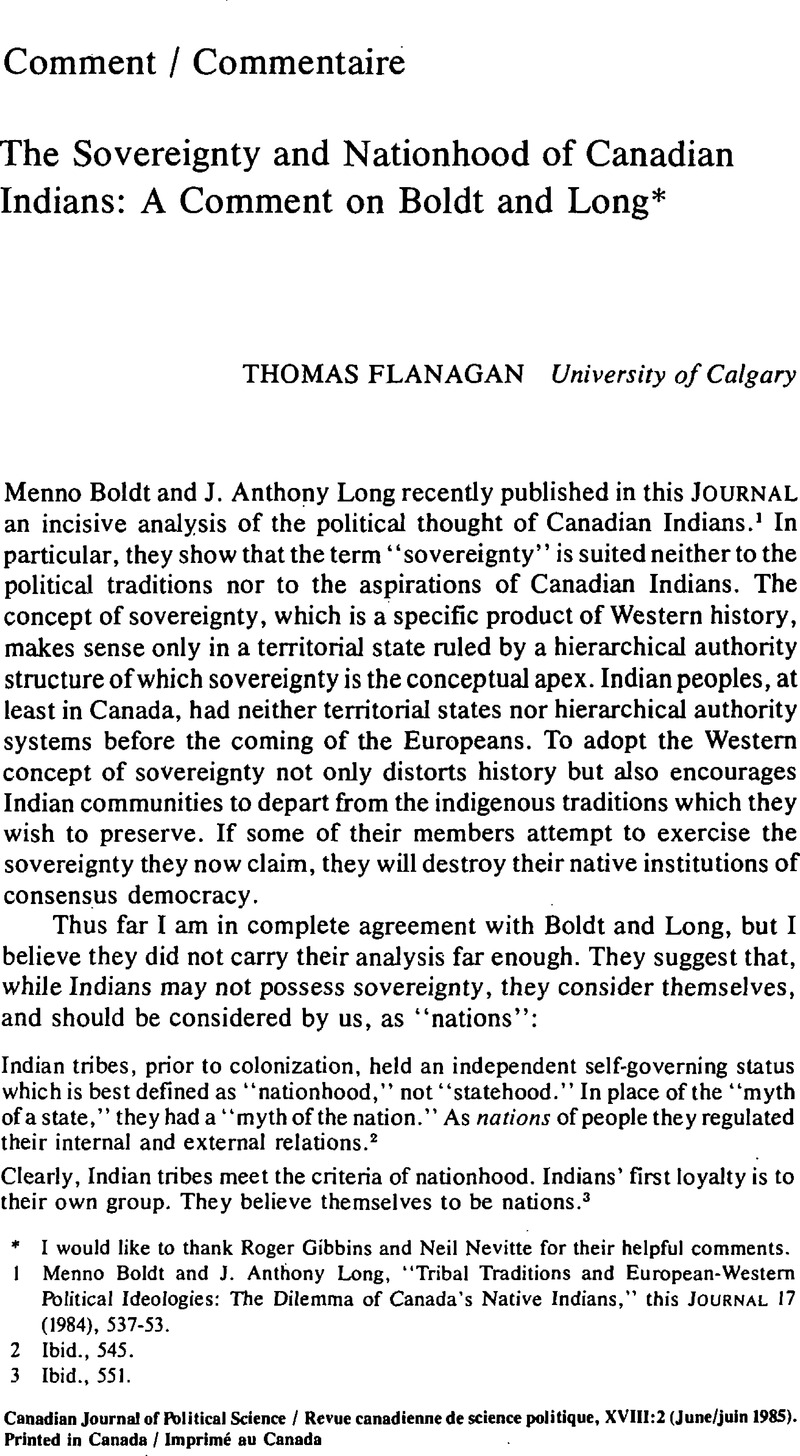Article contents
The Sovereignty and Nationhood of Canadian Indians: A Comment on Boldt and Long*
Published online by Cambridge University Press: 10 November 2009
Abstract

- Type
- Comments/Commentaires
- Information
- Canadian Journal of Political Science/Revue canadienne de science politique , Volume 18 , Issue 2 , June 1985 , pp. 367 - 374
- Copyright
- Copyright © Canadian Political Science Association (l'Association canadienne de science politique) and/et la Société québécoise de science politique 1985
References
1 Boldt, Menno and Long, J. Anthony, “Tribal Traditions and European-Western Political Ideologies: The Dilemma of Canada's Native Indians,” this JOURNAL 17 (1984), 537–53.Google Scholar
2 Ibid., 545.
3 Ibid., 551.
4 Smith, DerekG.(ed.), Canadian Indians and the Law; Selected Documents, 1663–1972 (Toronto: McClelland Stewart, 1975), 2.Google Scholar
5 Morris, Alexander, The Treaties of Canada with the Indians of Manitoba and the North-West Territories (Toronto: Belfords, Clarke & Co., 1880), 299.Google Scholar
6 Cherokee Nation v. Georgia (1831), 5 Peters 1, at 16.
7 See the entry under “nation” in the Oxford English Dictionary.
8 Of course the term never died out altogether; witness the “Six Nations.” But for the most part Indian claims were not couched in the language of nationalism.
9 Cardinal, Harold, The Unjust Society (Edmonton: Hurtig, 1969), 14.Google Scholar
10 Manuel, George and flosluns, Michael, The Fourth World: An Indian Reality (Don Mills: Collier Macmillan Canada, 1974), 268, footnote 12.Google Scholar
11 Watkins, Mel (ed.), Dene Nation: The Colony Within (Toronto: University of Toronto Press, 1977), 3.Google Scholar
12 House of Commons, Special Committee on Indian Self-Government, Indian Self-Government in Canada (Ottawa: Queen's Printer, 1983), 7, 53–54.Google Scholar
13 Indian and Northern Affairs Canada, “Statement by the Honourable John C. Munro... on the Indian Self-Government Bill, June 27, 1984,” Release 3–8406, page 3.
14 Voegelin, Eric, The New Science of Politics (Chicago: University of Chicago Press, 1952), 27.Google Scholar
15 Cardinal, Harold, The Rebirth of Canada's Indians (Edmonton: Hurtig, 1977), 141.Google Scholar
16 Boldt and Long, “Tribal Traditions and European-Western Political Ideologies,” 551.
17 Ibid., footnote 42.
18 Ibid.
19 Watkins, Dene Nation, 4.
20 For example, Opekokew, Delia, The First Nations: Indian Government and the Canadian Confederation (Saskatoon: Federation of Saskatchewan Indians, 1980)Google Scholar. Although I do not deal with the Metis here, they, too, have adopted the rhetoric of nationalism. See, for example, Daniels, Harry W., We Are the New Nation (Ottawa: Native Council of Canada, 1979).Google Scholar
21 Hayes, Carlton H. J., Essays on Nationalism (New York: Russell & Russell, 1966; original ed. 1926), 4–5.Google Scholar
22 Renan, Ernest, “What is a Nation?” in Dickerson, Mark O., Flanagan, Thomas, and Nevitte, Neil (eds.). Introductory Readings in Government and Politics (Toronto: Methuen, 1983), 41.Google Scholar
23 Kohn, Hans, Nationalism: Its Meaning and History (rev. ed.; New York: Van Nostrand Reinhold, 1965), 9.Google Scholar
24 Deutsch, Karl W., Nationalism and Its Alternatives (New York: Alfred A. Knopf, 1969), 19.Google Scholar
25 Renan, “What is a Nation,” 47.
26 Snyder, Louis L., Global Mini-Nationalism: Autonomy or Independence (Westport: Greenwood Press, 1982).Google Scholar
27 Nevitte, Neil, “Nationalism, States, and Nations,” in Feldman, Elliot J. and Nevitte, Neil (eds.), The Future of North America: Canada, The United States, and Quebec Nationalism (Cambridge: Harvard Center for International Affairs, 1979), 344.Google Scholar
28 Barsh, Russell Laurence and Henderson, James Youngblood, The Road: Indian Tribes and Political Liberty (Berkeley: University of California Press, 1980), 270–82.Google Scholar
29 Indian Self-Government in Canada.
30 Gibbins, Roger and Ponting, J. Rick, “The Paradoxical Nature of the Penner Report,” Canadian Public Policy 10 (1984), 222–23.Google Scholar
31 Emerson, Rupert, From Empire to Nation (Cambridge: Harvard University Press, 1962), 99.Google Scholar
32 Indian and Northern Affairs Canada, Native Peoples and the North: A Profile (Ottawa, 1982), 3.Google Scholar
33 Deutsch, , Nationalism and Its Alternatives, 21–25.Google Scholar
- 2
- Cited by


